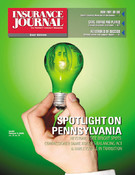New York Attorney General Eliot Spitzer, who has shown he is willing to take on securities analysts, the mutual fund industry, the insurance industry, the pharmaceutical industry and New York’s sitting governor, is also taking on the “pretenders to free markets” whom he identifies as the Chamber of Commerce, the Wall Street Journal, various industry leaders, President Bush and some of Bush’s regulatory appointees.
In remarks before the National Press Club in Washington, D.C., Spitzer, a Democrat who is running for governor of New York, called for a debate in the country over the role of government in regulating business behavior and ethics, claiming that he and his supporters, more so than established business leaders, understand what it takes to have free and fair markets.
“Today’s business leadership cloaks itself in the language of free markets but really stands for ossification and the status quo,” charged the controversial attorney general.
“On our side, we understand the markets and that government must step in now and then to define the boundaries and enforce the rules.”
He claimed that failures in business ethics harm consumers as well as other honest companies that play by the rules and he criticized powerful business leaders and regulators who claim to speak for free enterprise but do nothing to stop illegal and unethical behaviors.
The New York official cited instances where former Securities and Exchange Commission Chairman Harvey Pitt, the Wall Street Journal (which he dubbed “that paragon of free market doubletalk”) and business leaders from the Chamber of Commerce and the industries he has investigated have criticized and attempted to pre-empt his office from pursuing cases, rather than working to eradicate the problem behaviors.
He quoted one leading investment analyst as claiming that, “What used to be viewed as a conflict of interest is now seen as a synergy,” while dismissing concerns over misleading investment advice.
In another instance, he said he was told by a financial industry lawyer when confronted with the facts of unlawful activity, “You’re right, but we’re not as bad as our competitors.”
“What a defense!” Spitzer exclaimed, calling the abuses he has uncovered as proof that industry self-regulation doesn’t work. Many defenders claim that abuses are “honest mistakes” when they are in fact often illegal, he said. “They all knew what others were doing but they didn’t stop the behavior,” he noted. “They all sunk to the lowest common denominator.”
Spitzer likened his work to that of President Theodore Roosevelt 100 years ago in breaking up cartels. Roosevelt was then the “scourge” of business community and a constant critic of the failure of ethics in business, Spitzer maintained, yet most people in business today consider what he did beneficial for business expansion.
Spitzer spoke on the same day that he announced an $850 million settlement with Marsh over bid rigging, account steering and compensation practices. The monies from the settlement are to be used to refund insureds.
“Not a penny goes to the state or the lawyers. It all goes back to insureds,” Spitzer said. He noted that there could be additional suits from insureds who choose not to participate in the settlement he has made with Marsh.
The Empire State official said the settlement amount equals about one year of Marsh’s income from contingent commissions. “That’s where we got the figure,” he said.
In response to a question whether the abuses he uncovered in the insurance industry involved a “few bad apples,” he quipped that at a minimum he has uncovered a “few bad bushels.” He added, however, that he did “not want to paint the entire industry with a broad brush,” acknowledging that there are “many spectacular” people in the insurance industry.
The agreement with Marsh includes a prohibition that Marsh not accept contingent commissions but Spitzer said he was not prepared to say that such fees should be banned industry-wide. The problem at Marsh was that such fees were being used in ways that “fundamentally” distorted the marketplace, abused fiduciary duties and inflated premiums. “There may be other contexts where contingent agreements might not usurp decision-making and fiduciary duty,” he added.
Spitzer also took a swipe at President Bush for repeatedly talking about problems that drive up insurance premiums “without saying a single word” about how illegal insurance practices drive up costs to buyers.
“Corruption in the insurance industry is rife,” Spitzer claimed.
Was this article valuable?
Here are more articles you may enjoy.


 GEICO Settles Call-Center Worker Suits for $940,000; Attorneys Get Half
GEICO Settles Call-Center Worker Suits for $940,000; Attorneys Get Half  Charges Dropped Against ‘Poster Boy’ Florida Contractor Accused of Insurance Fraud
Charges Dropped Against ‘Poster Boy’ Florida Contractor Accused of Insurance Fraud  Allstate Doubles Q4 Net Income While Auto Underwriting Income Triples
Allstate Doubles Q4 Net Income While Auto Underwriting Income Triples  Chubb CEO Greenberg on Personal Insurance Affordability and Data Centers
Chubb CEO Greenberg on Personal Insurance Affordability and Data Centers 


